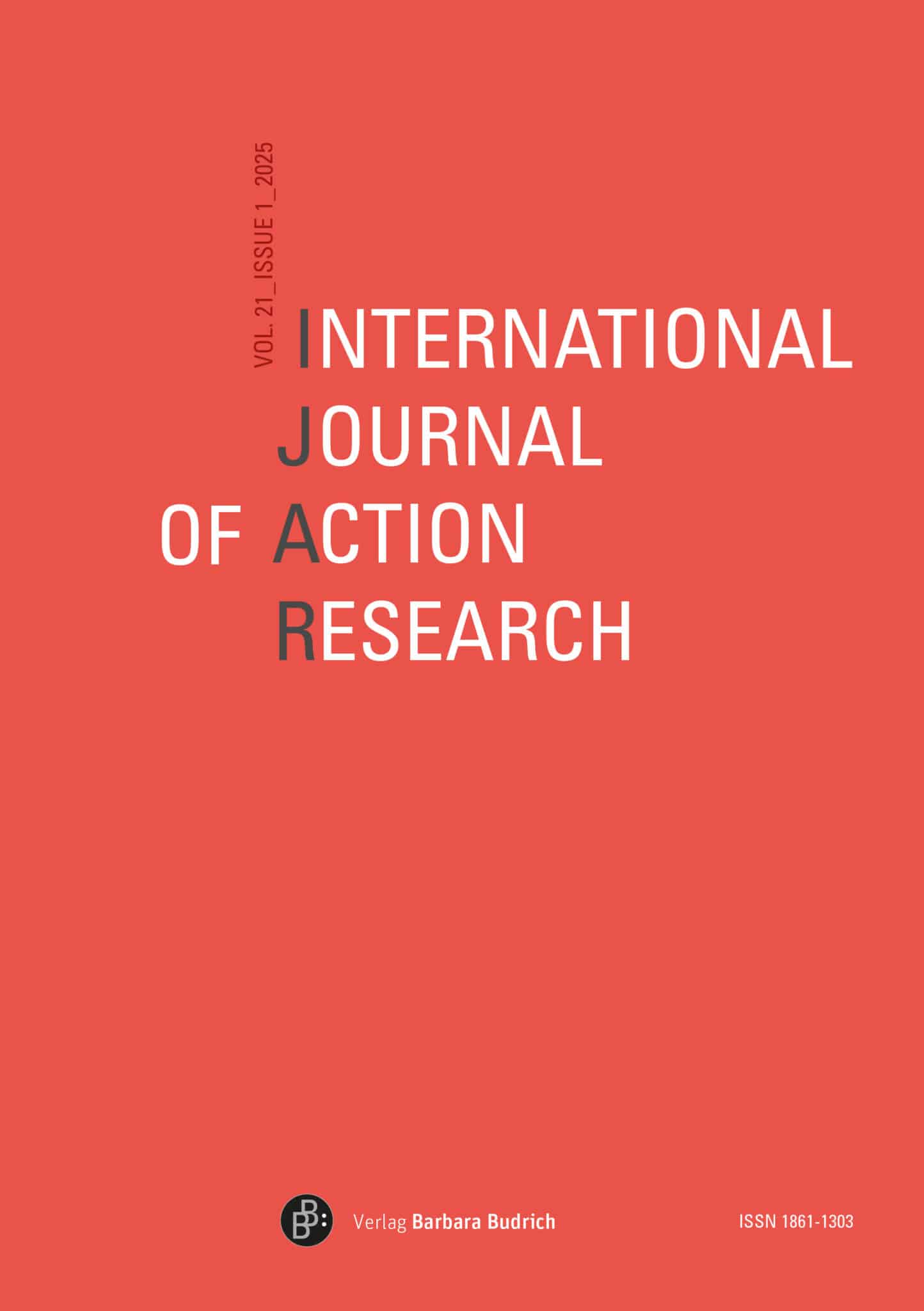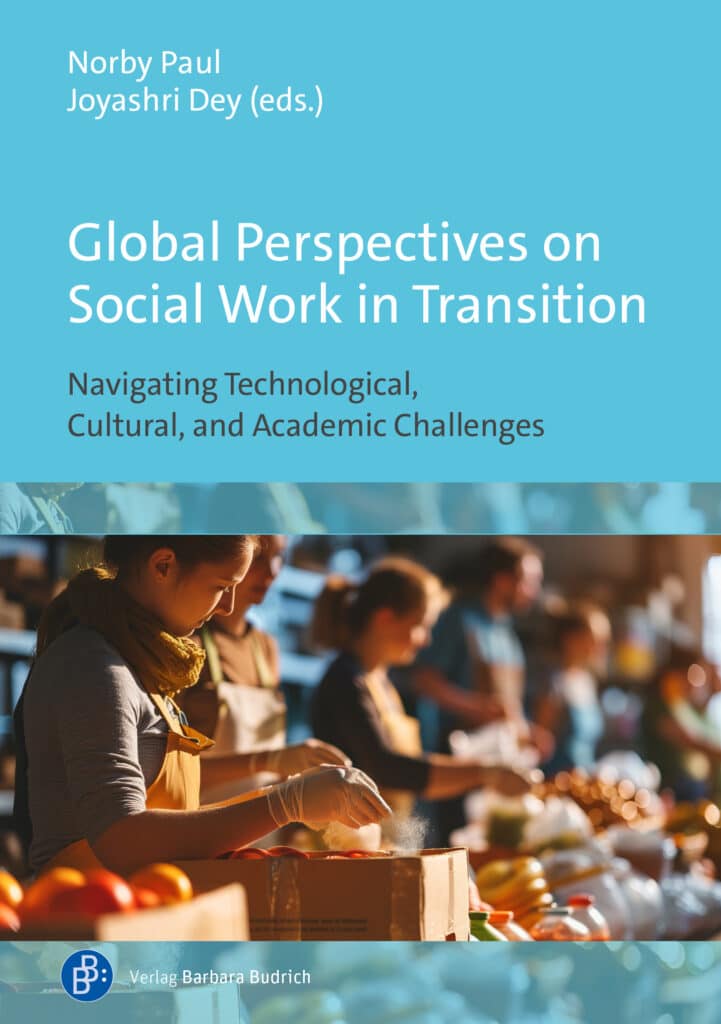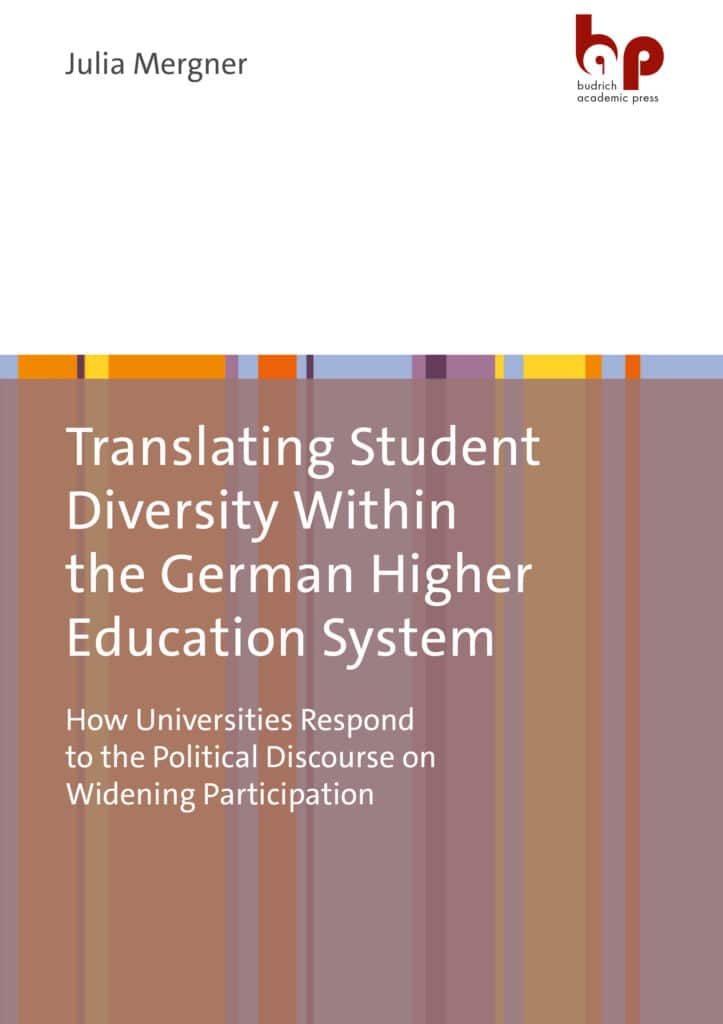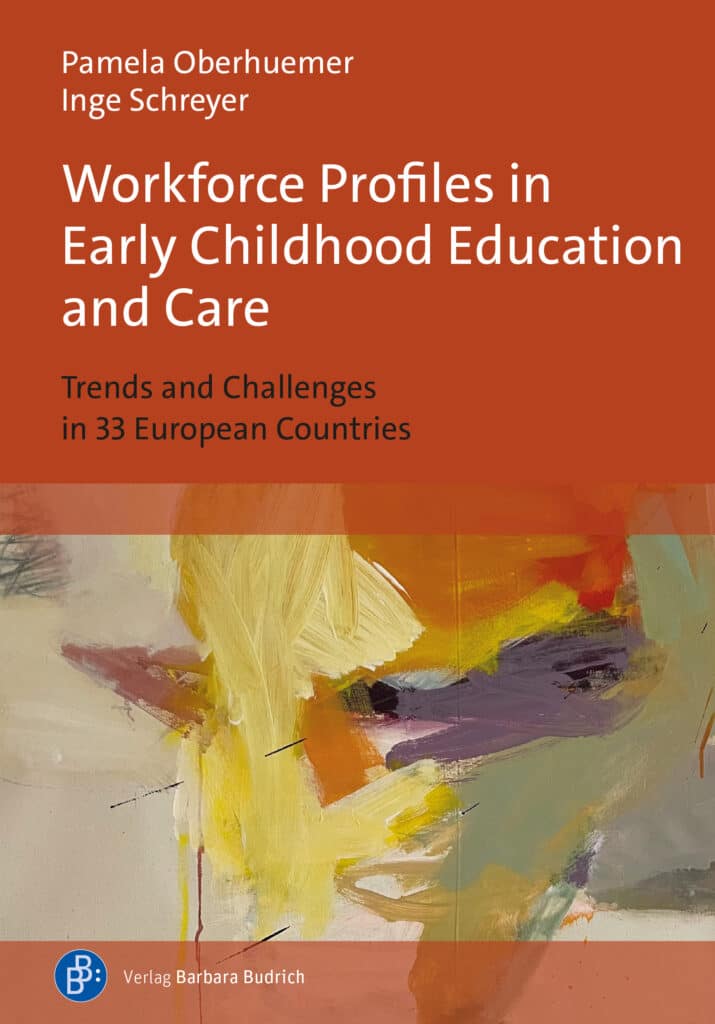Informationen zur Zeitschrift
Startseite » Programm » IJAR 1-2025 | Working with Action Research for Sustainable and Regenerative Environments, Communities, and Organizations: Wicked Problems Demand Action
IJAR 1-2025 | Working with Action Research for Sustainable and Regenerative Environments, Communities, and Organizations: Wicked Problems Demand Action
Erscheinungsdatum : 03.06.2025
29,00 €
- Inhalt
- Bibliografie
- Produktsicherheit
- Zusatzmaterial
- Bewertungen (0)
- Autor*innen
- Schlagwörter
- Abstracts
Inhalt
IJAR – International Journal of Action Research
1-2025: Working with Action Research for Sustainable and Regenerative Environments, Communities, and Organizations: Wicked Problems Demand Action
Editorial
Søren Frimann / Lone Hersted / Ottar Ness: Special Issue: Working with Action Research for Sustainable and Regenerative Environments, Communities, and Organizations: Wicked Problems Demand Action
Articles
Britta Møller: Caring Action Research: Lessons learned from performing research with(in) care
Eeva Houtbeckers: Working the insider–outsider hyphen in action research for sustainability: tensions in citizen-led multi-stakeholder forest dialogues
Karina Solsø / Emma Crewe / Kiran Chauhan: A neo-complexity orientation to action research: perspectives on unpredictability and ethics
Søren Frimann / Lone Hersted / Ottar Ness: Action Research for the Development of Welfare
Interview
Danilo Streck / Lone Hersted: Interview with Julie Borup Jensen. Our Bodies in Action Research: Senses, experience, and aesthetic awareness
Download of single articles (Open Access/fee-based): ijar.budrich-journals.com
You can register here for the IJAR alert.
Einzelbeitrag-Download (Open Access/Gebühr): ijar.budrich-journals.com
Sie können sich hier für den IJAR-Alert anmelden.
Zusätzliche Information
| Verlag | |
|---|---|
| ISSN | 1861-1303 |
| eISSN | 1861-9916 |
| Jahrgang | 21. Jahrgang 2025 |
| Ausgabe | 1-2025 |
| Erscheinungsdatum | 03.06.2025 |
| Umfang | 84 Seiten |
| Sprache | Englisch |
| Format | 17 x 24 cm |
| DOI | |
| Homepage |
Zusatzmaterial
Table of Contents / Inhaltsverzeichnis
Extracts / Leseproben
Autor*innen
Schlagwörteraction research, action research for sustainability, agro-pastoralists, care, care ethics, caring action research, co-creative inquiry, Complexity, Dialogue, ecofeminism, forest, hyphen-spaces, Juni 2025, Nordic Welfare Model, positionality, relational welfare, research methods, social sustainability, unpredictability
Abstracts
Caring Action Research: Lessons learned from performing research with(in) care (Britta Møller)
This paper bridges care ethics (Tronto, Noddings) with action research (AR), introducing Caring Action Research (CAR) as a framework for understanding AR as a caring practice. Based on a study conducted with a Danish elderly care department and a vocational college for care workers, the research employs design-based trials to facilitate shared inquiry into challenging situations in care work and education. The analysis reveals key dynamics: participants’ mutual recognition; the negotiation of power relations; and the collaborative development of design-based trials. CAR emerges as a valuable approach to addressing professional and educational challenges, rooted in caring ethics. Keywords: care ethics, care, caring action research, action research, co-creative inquiry
» Buy Single Contribution (Budrich Journals) / Einzelbeitrag kaufen (Budrich Journals)
Working the insider–outsider hyphen in action research for sustainability: tensions in citizen-led multi-stakeholder forest dialogues (Eeva Houtbeckers)
Socio-ecological crises such as global warming and biodiversity loss have resulted in calls for action research for sustainability. This article provides an account of one action research for sustainability to expand the understanding of how such processes can address the cultural dualisms and hierarchies identified in ecofeminism. The need to both protect and use forests has resulted in heated debates in which citizens are underrepresented. I as a scholar was involved in a working group that established and managed a citizen-led, multi-stakeholder forest movement that organised 15 forest dialogues between 2018 and 2022. This article describes what happened when the Our Forests citizen movement entered the heated Finnish forest policy debates. More particularly, I explore my movement as a scholar and that of the Our Forests working group in the insider–outsider hyphen. While Our Forests managed to attract key forest stakeholders to dialogues to enrich participants’ understandings and learn from each other, mistrust and looping forest debates undermined further consensus. To enable societal transformation, paying more attention to hyphen-spaces along which participants move can reveal what is shared – and what is not – between participants in action research for sustainability and form new alliances. Keywords: action research for sustainability, forest, dialogue, hyphen-spaces, positionality, ecofeminism
» Buy Single Contribution (Budrich Journals) / Einzelbeitrag kaufen (Budrich Journals)
A neo-complexity orientation to action research: perspectives on unpredictability and ethics (Karina Solsø, Emma Crewe, Kiran Chauhan)
The influence of complexity theory on action research scholarship and practice has been kaleidoscopic. Further integrating ideas derived from the complexity sciences could enrich this research tradition, but there are choices to be made about what to prioritise. We distinguish complexity-informed approaches that privilege control from those adopting radical open-endedness. The former often aligns with managerialist assumptions, which tend to deny the messiness and moral dimensions of living and working. In contrast, ‘neo-complexity’ aims to reemphasise the most intellectually, politically, and emotionally radical implications of complexity science: embracing unpredictability, plurality, and practice-based ethics. An example of an action research coalition of Ethiopia, Mursi and UK researchers allows us to describe what this means in practice. Keywords: complexity, unpredictability, agro-pastoralists, research methods
» Buy Single Contribution (Budrich Journals) / Einzelbeitrag kaufen (Budrich Journals)
Action Research for the Development of Welfare (Søren Frimann, Lone Hersted, Ottar Ness)
The Nordic welfare model, known for its universality and commitment to equality, has evolved over time to address the social needs of its citizens through benefits such as healthcare, education and social security. Despite its strengths, the model faces challenges, including increasing social inequality, demographic changes and increased immigration. These challenges call for new solutions that can sustain the welfare state in the adaptation to contemporary issues. As we see it, there is a need for civic engagement and co-creation based on dialogue to find sustainable solutions to our societal challenges. In this perspective, we propose action research as a powerful approach to addressing some of these challenges, particularly in promoting social sustainability in communities and organisations. By emphasising dialogue, collaboration and democratic participation, action research has the potential to empower different stakeholders and local communities to co-create solutions on complex social problems. It moves beyond traditional top-down governance, while facilitating dialogues and processes based on citizen and employee engagement. Illustrative examples from Norway and Denmark demonstrate the impact of action research in improving welfare, particularly through projects like the Citizens’ Model and a project for co-developing organisational learning in a public institution specialised in hearing loss and deafblindness. These examples show how action research can foster social sustainability by empowering marginalised groups and a variety of voices, contributing to the improvement of welfare for present and future generations. Keywords: Action Research, Nordic Welfare Model, Relational Welfare, Social Sustainability
» Buy Single Contribution (Budrich Journals) / Einzelbeitrag kaufen (Budrich Journals)
Inhalt
Inhalt
IJAR – International Journal of Action Research
1-2025: Working with Action Research for Sustainable and Regenerative Environments, Communities, and Organizations: Wicked Problems Demand Action
Editorial
Søren Frimann / Lone Hersted / Ottar Ness: Special Issue: Working with Action Research for Sustainable and Regenerative Environments, Communities, and Organizations: Wicked Problems Demand Action
Articles
Britta Møller: Caring Action Research: Lessons learned from performing research with(in) care
Eeva Houtbeckers: Working the insider–outsider hyphen in action research for sustainability: tensions in citizen-led multi-stakeholder forest dialogues
Karina Solsø / Emma Crewe / Kiran Chauhan: A neo-complexity orientation to action research: perspectives on unpredictability and ethics
Søren Frimann / Lone Hersted / Ottar Ness: Action Research for the Development of Welfare
Interview
Danilo Streck / Lone Hersted: Interview with Julie Borup Jensen. Our Bodies in Action Research: Senses, experience, and aesthetic awareness
Download of single articles (Open Access/fee-based): ijar.budrich-journals.com
You can register here for the IJAR alert.
Einzelbeitrag-Download (Open Access/Gebühr): ijar.budrich-journals.com
Sie können sich hier für den IJAR-Alert anmelden.
Bibliografie
Zusätzliche Information
| Verlag | |
|---|---|
| ISSN | 1861-1303 |
| eISSN | 1861-9916 |
| Jahrgang | 21. Jahrgang 2025 |
| Ausgabe | 1-2025 |
| Erscheinungsdatum | 03.06.2025 |
| Umfang | 84 Seiten |
| Sprache | Englisch |
| Format | 17 x 24 cm |
| DOI | |
| Homepage |
Produktsicherheit
Zusatzmaterial
Zusatzmaterial
Table of Contents / Inhaltsverzeichnis
Extracts / Leseproben
Bewertungen (0)
Bewertungen
Es gibt noch keine Bewertungen.
Autor*innen
Autor*innen
Schlagwörter
Schlagwörteraction research, action research for sustainability, agro-pastoralists, care, care ethics, caring action research, co-creative inquiry, Complexity, Dialogue, ecofeminism, forest, hyphen-spaces, Juni 2025, Nordic Welfare Model, positionality, relational welfare, research methods, social sustainability, unpredictability
Abstracts
Abstracts
Caring Action Research: Lessons learned from performing research with(in) care (Britta Møller)
This paper bridges care ethics (Tronto, Noddings) with action research (AR), introducing Caring Action Research (CAR) as a framework for understanding AR as a caring practice. Based on a study conducted with a Danish elderly care department and a vocational college for care workers, the research employs design-based trials to facilitate shared inquiry into challenging situations in care work and education. The analysis reveals key dynamics: participants’ mutual recognition; the negotiation of power relations; and the collaborative development of design-based trials. CAR emerges as a valuable approach to addressing professional and educational challenges, rooted in caring ethics. Keywords: care ethics, care, caring action research, action research, co-creative inquiry
» Buy Single Contribution (Budrich Journals) / Einzelbeitrag kaufen (Budrich Journals)
Working the insider–outsider hyphen in action research for sustainability: tensions in citizen-led multi-stakeholder forest dialogues (Eeva Houtbeckers)
Socio-ecological crises such as global warming and biodiversity loss have resulted in calls for action research for sustainability. This article provides an account of one action research for sustainability to expand the understanding of how such processes can address the cultural dualisms and hierarchies identified in ecofeminism. The need to both protect and use forests has resulted in heated debates in which citizens are underrepresented. I as a scholar was involved in a working group that established and managed a citizen-led, multi-stakeholder forest movement that organised 15 forest dialogues between 2018 and 2022. This article describes what happened when the Our Forests citizen movement entered the heated Finnish forest policy debates. More particularly, I explore my movement as a scholar and that of the Our Forests working group in the insider–outsider hyphen. While Our Forests managed to attract key forest stakeholders to dialogues to enrich participants’ understandings and learn from each other, mistrust and looping forest debates undermined further consensus. To enable societal transformation, paying more attention to hyphen-spaces along which participants move can reveal what is shared – and what is not – between participants in action research for sustainability and form new alliances. Keywords: action research for sustainability, forest, dialogue, hyphen-spaces, positionality, ecofeminism
» Buy Single Contribution (Budrich Journals) / Einzelbeitrag kaufen (Budrich Journals)
A neo-complexity orientation to action research: perspectives on unpredictability and ethics (Karina Solsø, Emma Crewe, Kiran Chauhan)
The influence of complexity theory on action research scholarship and practice has been kaleidoscopic. Further integrating ideas derived from the complexity sciences could enrich this research tradition, but there are choices to be made about what to prioritise. We distinguish complexity-informed approaches that privilege control from those adopting radical open-endedness. The former often aligns with managerialist assumptions, which tend to deny the messiness and moral dimensions of living and working. In contrast, ‘neo-complexity’ aims to reemphasise the most intellectually, politically, and emotionally radical implications of complexity science: embracing unpredictability, plurality, and practice-based ethics. An example of an action research coalition of Ethiopia, Mursi and UK researchers allows us to describe what this means in practice. Keywords: complexity, unpredictability, agro-pastoralists, research methods
» Buy Single Contribution (Budrich Journals) / Einzelbeitrag kaufen (Budrich Journals)
Action Research for the Development of Welfare (Søren Frimann, Lone Hersted, Ottar Ness)
The Nordic welfare model, known for its universality and commitment to equality, has evolved over time to address the social needs of its citizens through benefits such as healthcare, education and social security. Despite its strengths, the model faces challenges, including increasing social inequality, demographic changes and increased immigration. These challenges call for new solutions that can sustain the welfare state in the adaptation to contemporary issues. As we see it, there is a need for civic engagement and co-creation based on dialogue to find sustainable solutions to our societal challenges. In this perspective, we propose action research as a powerful approach to addressing some of these challenges, particularly in promoting social sustainability in communities and organisations. By emphasising dialogue, collaboration and democratic participation, action research has the potential to empower different stakeholders and local communities to co-create solutions on complex social problems. It moves beyond traditional top-down governance, while facilitating dialogues and processes based on citizen and employee engagement. Illustrative examples from Norway and Denmark demonstrate the impact of action research in improving welfare, particularly through projects like the Citizens’ Model and a project for co-developing organisational learning in a public institution specialised in hearing loss and deafblindness. These examples show how action research can foster social sustainability by empowering marginalised groups and a variety of voices, contributing to the improvement of welfare for present and future generations. Keywords: Action Research, Nordic Welfare Model, Relational Welfare, Social Sustainability
» Buy Single Contribution (Budrich Journals) / Einzelbeitrag kaufen (Budrich Journals)









Bewertungen
Es gibt noch keine Bewertungen.